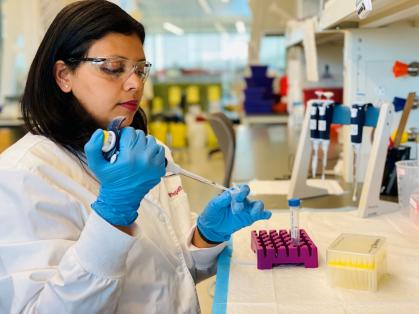Rutgers Researcher Awarded $1.9 Million NIH Grant Focused on Lipid Research

A Rutgers researcher has received a $1.9 million award from the National Institutes of Health (NIH) to investigate the role of an enzyme in the gut and its potential as a therapy to help lower lipid levels in the blood.
Harini Sampath, assistant professor in the Department of Nutritional Sciences at the School of Environmental and Biological Sciences in Rutgers-New Brunswick, is the Principal Investigator (PI) of a R-01 grant valued at $1,958,160 and funded by the NIH – National Institute of Diabetes and Digestive and Kidney Diseases. The five-year project, “The role of intestinal SCD1 in regulating metabolic health,” runs through May 2026.
Heart disease is the primary cause of death in both men and women in the United States. In fact, about 1 in 4 deaths in the U.S. is attributed to heart disease, and management of this condition costs the U.S. almost $400 billion annually. According to the Centers for Disease Control and Prevention, coronary artery disease is the most common form of heart disease and is influenced by a number of risk factors, including unhealthy diets, high blood cholesterol, type 2 diabetes, and obesity, among others
Sampath and her lab are focused on understanding what cellular pathways are altered during the development of obesity and related conditions such as diabetes and heart disease. “In this way, we seek to identify pathways that can be targeted for nutritional and pharmaceutical therapies to preserve health and improve health outcomes,” she said.
Many decades of research have shown that increased intake of saturated fat, the kind found in red meat and dairy, is associated with increased levels of LDL or bad cholesterol, which in turn raises the risk for heart disease. Studies in Sampath’s lab are largely focused on an enzyme, stearoyl-CoA desaturase (SCD), which modifies saturated fats in the cell.
“Previous studies have shown that inhibiting this enzyme can reduce body weight and confer protection against obesity and related conditions. In this project, we are focused on elucidating a role for this enzyme in the gut,” she explained.
According to Sampath, everything we eat is seen by our intestine or gut, which is an important regulatory and signaling organ. The gut carries out numerous functions, including sensing nutrients coming from the diet and enabling them to perform essential actions. Fats coming in from the diet are absorbed in the gut and secreted into the blood, for eventual use by other organs such as muscles and the liver. However, very high levels of fat in the blood following a meal can increase the risk for heart disease and diabetes.
“Thus, understanding how the gut regulates lipid absorption and secretion into the blood is of direct relevance to studying these diseases, which impact so many individuals in both developed and developing countries,” said Sampath. “Studies in our lab have identified a role for SCD in the intestine in modulating levels of fat in the blood, particularly following a meal high in saturated fat.”
“We have also discovered that SCD in the intestine modulates the amount of energy that an organism expends and may thus play a role in reducing weight gain on diets with varying fat levels. We are currently exploring the other effects of inhibiting this enzyme in the gut through dietary and pharmacological means,” she added.
As Sampath sees it, the potential benefits of this research are that these studies “will inform efforts to inhibit this enzyme in the gut as a possible therapeutic approach to lowering blood lipid levels and reducing the harmful consequences of dietary saturated fat intake.”



